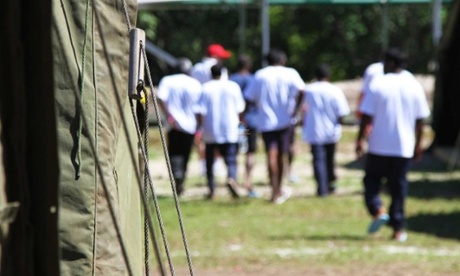Three peak medical groups say a new advisory body is needed to review the treatment of asylum seekers in detention

Three peak Australian medical bodies have renewed calls for the establishment of an independent medical advisory body to audit the treatment of asylum seekers in detention, following shocking evidence at the national inquiry into children in immigration detention on Thursday.
Dr Peter Young, the former medical director of mental health services at IHMS – the private company providing medical services in all Australian onshore and offshore detention centres, told the inquiry that the immigration department had asked him to withdraw figures that showed the huge rates of mental health problems amongst asylum seekers children in detention.
The figures showed that asylum seeker children measured significantly higher the HoNOSCA scale (Health of the Nation Outcome Scales for Child and Adolescent mental health) than the national average. 15% of asylum seeker children in detention on the mainland and on Christmas Island were scored three or four on the scale for symptoms of emotional distress – Young said a score of two was “clinically significant”.
The Royal Australasian College of Physicians (RACP), the Royal Australian College of General Practitioners (RACGP) and the Australian Medical Association (AMA) all issued statements following Young’s evidence, expressing concern at the revelations.
Professor Nicholas Talley said that the statistics themselves were “deeply concerning” but added: “I am even more alarmed at the evidence from Dr Peter Young that the federal government requested figures showing the true extent of these mental health concerns be suppressed,”.
“We urge the federal government to be open and transparent regarding the health of children in detention.”
In December last year the Coalition government disbanded the independent health group (Ihag) tasked with monitoring the health and conditions for asylum seekers in detention.
Talley said that the revelations at the day’s hearing reinforced that disbanding Ihag was “the wrong decision”.
“Expert independent immigration health advice is needed now more than ever. The government must start acting on the recommendations and advice of health experts to protect children in immigration detention,” Professor Talley said.
The RACGP, the peak body representing GPs accused the government of failing to uphold its ethical obligations in accordance with international human rights law.

An RACGP doctor, Liz Marles, said the college had a responsibility to advocate for doctors working with asylum seekers as well as the asylum seekers themselves.
“There is a substantial body of evidence, which demonstrates that detention, particularly prolonged detention causes negative physical and mental health consequences for asylum seekers,” she said.
“We know there are more humane ways of processing those who arrive on our shores seeking asylum and it is our duty to ensure these people, particularly children, are treated ethically and with respect.
She added that access to medical services was a fundamental human right.
“The majority of those in detention have unique mental and physical healthcare needs as a consequence of the circumstances they have fled and these are further exacerbated by a prolonged period of uncertainty in detention,” she said.
At the hearing on Thursday, immigration department secretary Martin Bowles said he was unaware of requests to withdraw the statistics and added that if any departmental staff had behaved inappropriately, he would act.
“The Australian Government must treat asylum seekers as a humanitarian rather than a political issue,” she said.
The AMA has long called for better medical treatment of asylum seekers. Their official statement calls for humanity to be “restored to an otherwise inhumane approach to asylum seekers”.
Their president, associate professor Brian Owler, said the AMA was alarmed at the reports of serious and prolonged mental health issues affecting child asylum seekers in particular.
“The AMA has long called for openness and honesty about the state of physical and mental health of all asylum seekers in detention in Australian care,” he said.
“It is our duty to act compassionately and ethically to these vulnerable people, many of whom have fled conflict and danger.
He reiterated the association’s previous calls for a highly qualified, independent panel of medical experts to regularly visit detention centres, assess the health services and the health status of detainees, and report back directly to the Parliament.
“Such a process would help the government fulfil its human rights obligations in regard to asylum seekers,” Owler said.
